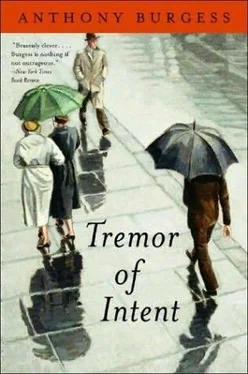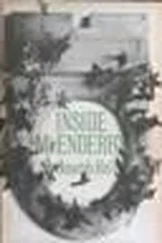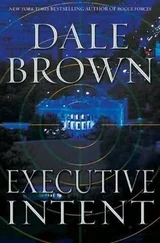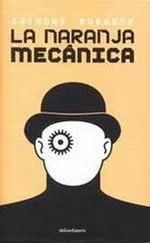Anthony Burgess - Tremor of Intent
Здесь есть возможность читать онлайн «Anthony Burgess - Tremor of Intent» весь текст электронной книги совершенно бесплатно (целиком полную версию без сокращений). В некоторых случаях можно слушать аудио, скачать через торрент в формате fb2 и присутствует краткое содержание. Жанр: Современная проза, на английском языке. Описание произведения, (предисловие) а так же отзывы посетителей доступны на портале библиотеки ЛибКат.
- Название:Tremor of Intent
- Автор:
- Жанр:
- Год:неизвестен
- ISBN:нет данных
- Рейтинг книги:4 / 5. Голосов: 1
-
Избранное:Добавить в избранное
- Отзывы:
-
Ваша оценка:
- 80
- 1
- 2
- 3
- 4
- 5
Tremor of Intent: краткое содержание, описание и аннотация
Предлагаем к чтению аннотацию, описание, краткое содержание или предисловие (зависит от того, что написал сам автор книги «Tremor of Intent»). Если вы не нашли необходимую информацию о книге — напишите в комментариях, мы постараемся отыскать её.
Has more wit and comic invention than the books which it so boisterously ridicules. – New Republic
Tremor of Intent — читать онлайн бесплатно полную книгу (весь текст) целиком
Ниже представлен текст книги, разбитый по страницам. Система сохранения места последней прочитанной страницы, позволяет с удобством читать онлайн бесплатно книгу «Tremor of Intent», без необходимости каждый раз заново искать на чём Вы остановились. Поставьте закладку, и сможете в любой момент перейти на страницу, на которой закончили чтение.
Интервал:
Закладка:
And poor Roper, cut off from his science – though he learned the tricks of his corps so well that he was very quickly promoted – and living more with his emotional and instinctive needs, began to be aware of emptiness. 'If only I could be re-converted or else converted to something else. What's the point of fighting this war if we don't believe that one way of life is better than another? And that's not the same as saying that our way is bad but the Nazi way is worse. That won't do. You can't fight negatively. A war should be a sort of crusade. But what for?'
And then, God help us, Roper started to read poetry. 'But,' he wrote, 'I can't get much out of this very difficult poetry. I've got a scientific brain, I suppose, and I like a word to mean one thing and one thing only. That's why I've been going back to people like Wordsworth, who really does say what he means, even though you can't always agree with what he says. But at least there's a man who made a religion for himself, and, when you come to think of it, it's a scientific religion in a way. Nature – trees and rivers and mountains and so on – is something that's really there, it encloses us. I think of those Nazi bastards coming over and blasting England, and I get a sort of picture of England suffering – I don't mean just the people and the cities they've built, but the trees and the countryside and the grass, and I feel more bitter than if it was Christ on His cross. Is this some sort of new religious sense I've got? Would you say it was irrational?'.
A delightful and inevitable progression from bare reason to sentimentality to sex. He wrote to me from Chesham in 1943, saying that he was doing some sort of course on Army Hygiene and, in his spare time, going out with a girl called Ethel. 'She's tall and fair and has blunt fingers and is very wholesome, and she works in a snack-bar on the High Street. Would you say I was late in losing my virginity? We go out into the fields and it's all very pleasant and not very exciting, and I don't feel any guilt at all. Would it be better if I did feel guilt? I seem to have come very close to England since I stopped believing in Catholicism, close to the heart or essential nature of England I mean. What I find there is a sublime kind of innocence. England would take neither Catholicism nor Puritanism for very long-those faiths built on sin just rolled off like water from a duck's back. And then, when I think of Nazi Germany, what do I find but another kind of innocence, a sort of malevolent innocence which enables them to perpetrate the most incredible atrocities and still see nothing wrong there. Is there anybody anywhere who is feeling guilt for this war? I lie in the cornfield with Ethel and, to spice it up with guilt, I imagine this is adultery – she isn't married – or incest, but it won't work. Of course, in a way it is incest, for we're all supposed to be bound together in a big happy family, brothers and sisters, directing our sexual hate, all hate being really sexual, against the enemy.'
The really significant letter from Roper came from defeated Germany. 'I shall never eat meat again,' he said, 'never as long as I live. The camp was full of meat, layers and layers of it, some of it still alive. Human meat, sweet surely because it was so near the bone, with the flies buzzing over it and grubs moving. The smell was of a massive cheese factory. We were the first in, and we wasted no time in squirting our patent Mark IV antiseptic sprays, retching while we did it. I had met this word necropolis before and thought it to be a sort of poetic term for describing a city at dead of night, a city of locked houses from which all the living seemed to have fled. Now I saw what a necropolis really was. How many dead or dying citizens did this contain? I had not thought it possible that so many dead could be brought together in one place, and all arranged and stacked so neatly, sometimes dead with still alive. I passed along the neat made-in-Germany streets that had house-high hedges of piled corpses on either side, spraying away, but the spray, for all its powerful smell of clean kitchen-sinks and lavatory-bowls, couldn't at all erase the stink of the dead.'
That, sir, was Roper – QMS Roper – in the spearhead of the invasions of cleaners-up after the German surrender. The letter, and the three letters that followed (he was just talking the anguish out on the paper), spoke of vomiting and a mad fear that the near-corpses would suddenly topple their fully dead brothers from the pile and come to lap up half-digested protein. They also told of nightmares of a sort we all had, all those of us who'd entered the death-camps and stood paralysed, our mouths in rictu but whether for retching or out of sheer incredulity the mouths them- selves could not at first tell. We had to gape; it was the only possible oral response to what we saw and smelt. We didn't want to believe, since belief that a civilised nation had been capable of all this must overturn everything we'd ever taken for granted about civilisation, progress, the elevating power of artistic, scientific, philosophical achievement (who could deny that the Germans were a great race?). For my part, I went in as sole sergeant-interpreter with a small Russo-American group (I have deliberately forgotten where the death-camp was) and found, what I should have known, that words, whether Russian or Anglo-American, were otiose.
Strangely, my own nightmares featured Roper more than myself, perhaps because Roper had written those letters. I could see him very clearly as I read them – pale, fattish, bespectacled (with those steel-rimmed respirator-spectacles that made the wearer look like an idiot child), a shaggy straw nape under the eaves of the steel helmet. In my dreams he did my moaning for me, vomiting up such dream-objects as the flywheels of clocks, black-letter books, wriggling snakes, and he sobbed very idiomatic German, full of words like Staunen (astonishment) and Sittlichkeit (morality) and Schicksal (destiny). His own nightmares were of the forced evening walk (a lovely sunset, the birds' last song) through groves of corpses, along with burrowing into hedges of blue flesh and (this was fairly common with all of us) actual necrophagy or corpse-eating. And then dreaming Roper allowed himself to appear as a sort of British Christ, John Bull Jesus crucified on his own Union Jack. The crucifixion was either punishment or expiation or identification – he couldn't tell which. He'd done very little reading outside of physics and chemistry and very simple poetry.
But guilt was in his letters. These crimes had been committed by members of the human race, no different from himself. 'We should never have let this happen,' he wrote. 'We're all responsible.' I wrote back: 'Don't be so bloody stupid. The Germans are responsible and only the Germans. Admittedly, a lot of them won't have that because a lot of them won't believe what's been done in their name. They'll have to be shown, all of them. You can start off with the German women.' That's what I'd been doing. In a way, with their deep belly-consciousness or whatever the hell it is, the German women were already lining up to be punished. They didn't think it was that, of course; they thought they were just on the chocolate-buying game like the women of any conquered country. But the deep processes of genetics were calling out for exogamy, fertilisation by foreign bodies, and the deeper moral processes were shrieking for punishment. Wait, though: aren't those aspects of the same thing? Isn't the angry punitive seed more potent than the good gentle stuff that dribbles out in the pink-sheeted marriage-bed? Isn't miscegenation a means of destroying ethnic identity and thus getting rid of national guilt? For my part, I didn't then ask such questions of the stocky women of Bremen. I got stuck into them, not sparing the rod. At the same time, showing my teeth and manhood, I was dimly aware that their menfolk, dead or merely absent, had got the better of me by making me one of themselves – brutal, lustful, something from a Gothic bestiary. Ah, what a bloody Manichean mess life is.
Читать дальшеИнтервал:
Закладка:
Похожие книги на «Tremor of Intent»
Представляем Вашему вниманию похожие книги на «Tremor of Intent» списком для выбора. Мы отобрали схожую по названию и смыслу литературу в надежде предоставить читателям больше вариантов отыскать новые, интересные, ещё непрочитанные произведения.
Обсуждение, отзывы о книге «Tremor of Intent» и просто собственные мнения читателей. Оставьте ваши комментарии, напишите, что Вы думаете о произведении, его смысле или главных героях. Укажите что конкретно понравилось, а что нет, и почему Вы так считаете.








